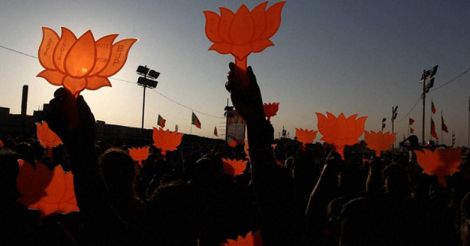BJP president Amit Shah prefers a convention center, run by New Delhi municipal committee, to hold his important brainstorming sessions rather than the nearby national headquarters of the ruling party. Thus, it was no surprise that the convention center was chosen for Shah's interactions with BJP MPs from Uttar Pradesh in two batches on the last two days of the seriously disrupted winter session of parliament.
Shah, who was the successful general secretary of the state during the 2014 Lok Sabha elections, has the weight of expectations that he would repeat the magical performance where BJP and its ally Apna Dal won 73 of the 80 seats, leaving just five for Mulayam Singh Yadav and his family, and two for the mother-son combination of Sonia Gandhi and Rahul Gandhi of the Congress. Shah was discussing the elections in Uttar Pradesh and four other states due early next year.
Shah has taken the election to the largest state as a personal challenge, and has spent the last one year on different regions of the state. He has wooed senior leaders of the Bahujan Samaj Party and the Congress into the BJP, and has worked out his caste calculus in a state where the balance is a delicate one among upper castes, Yadavs, other backward castes, dalits and Muslims. A strong degree of polarization by Narendra Modi among upper caste, OBC and even young dalits had led to the spectacular show of BJP. Now, Shah is spending long hours to ensure that the vote bank stay on with the saffron party.
Also Read: Eviction of the elite in Modi's Delhi
Developmental agenda of Modi rule
Interestingly, the MPs had lot of questions for Shah. While briefing him on the ground situation, both veterans and newcomers touched on the effect of demonetization of Rs 500 and Rs1,000 notes. There were even reports that Shah lost his cool that the members had little faith in the confidence of the prime minister that the situation would become normal. But the MPs were particular that normalcy should come before the election notification is issued, and were even in favour of delaying the elections till the situation is normalized.
Several MPs had another question for Shah: who would be the chief ministerial candidate of the party, as all other parties were projecting a name. Shah would not give a name saying that Narendra Modi would announce the chief ministerial candidate at the appropriate time. The MPs had in their mind the party’s bad performance in 2015 in Bihar, where it had no chief ministerial candidate and in Delhi, where retired police officer Kiran Bedi was para-dropped into the party as CM candidate just when nominations were closing. Bedi led the party to its most humiliating defeat, losing her own seat.
Also Read: Small gain, big pain: govt faces backlash over revenue-hike moves
Given the complexity of the competing castes and regions in Uttar Pradesh, which spreads from Jat and Muslim dominated western Uttar Pradesh through Yadav heartland to the upper caste dominated eastern parts, Shah was coy on the choice. The state BJP president Keshav Prasad Maurya, an OBC, was chosen by Shah, but upper caste leaders are saying the state has been dominated by either the Yadavs or dalits, and want the party to choose a Brahmin or Rajput. The last upper caste chief minister was Rajnath Singh, who is reluctant to give up the union home minister’s job, especially because he is the official number two in the cabinet.
The saffron party has the same dilemma in the smaller state of Uttarakhand where its attempt to topple the Harish Rawat ministry of the Congress came a cropper earlier this year. There are three ex chief ministers – Bhagat Singh Koshyari, B.C. Khanduri and Ramesh Pokhriyal - belonging to the BJP, all of whom are parliament members. But Modi wants a new face. Yet there is fear that the three veterans could spoil the party if a new candidate is anointed at the last stage.
In Goa, the party has no problem as it would go to polls with chief minister Laxmikant Parsekar, who is fully backed by defence minister Manohar Parrikar, the party's best known face in the state. It’s funny to note that the opposition Congress has no visible leader here, as former chief minister Digambar Kamat is under a cloud over corruption charges.
The Congress has named Sheila Dixit as its chief ministerial candidate in Uttar Pradesh, but she is not much active, compared to chief minister Akhilesh Yadav and former chief minister Mayavati, who have been addressing big rallies back to back. Another star campaigner in Uttar Pradesh has been Modi.
In Punjab, the BJP has decided to stick to the alliance with the Badals of Akali Dal, playing second fiddle. Okram Ibobi Singh of the Congress has been chief minister of Manipur for the last 14 years and he would be defending his turf against the challenge of regional parties as well as the emergence of activist Irom Sharmila as a political player.

























